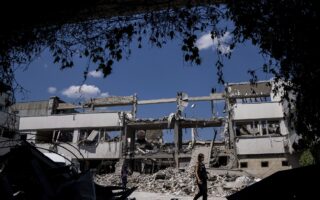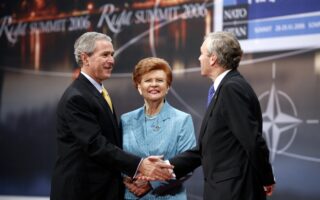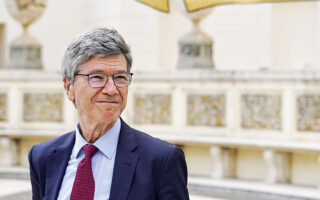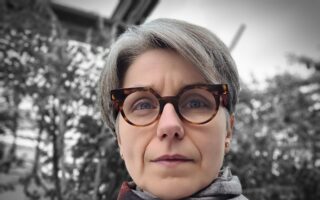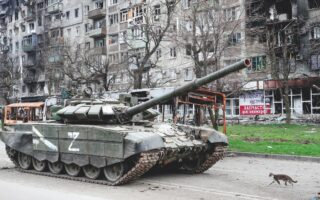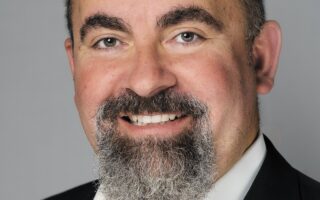Putin ‘wants to kill us and we want to live’
Ex-Ukraine president speaks to Kathimerini about the Russian invasion
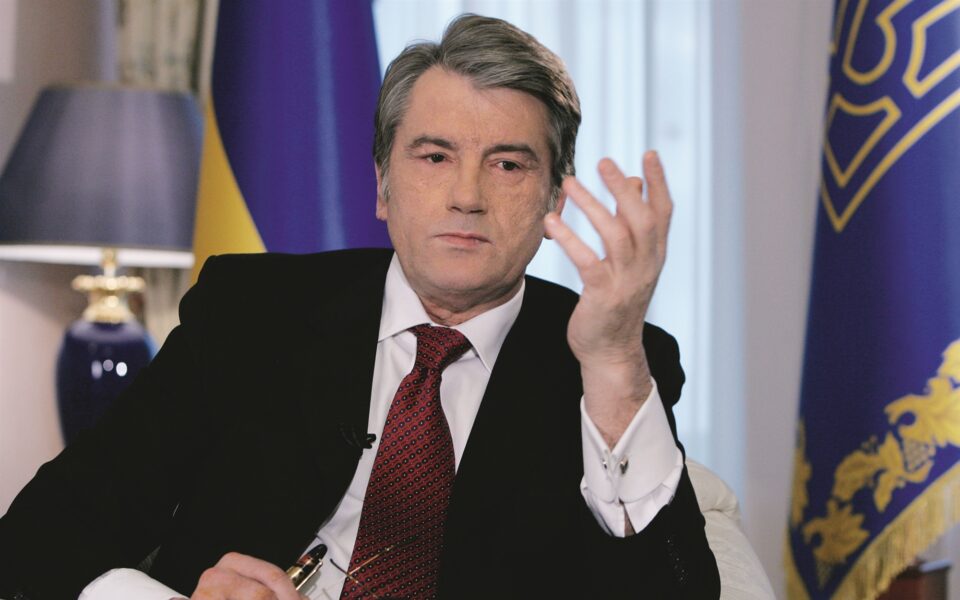
In late 2004, Europe was shocked by the poisoning of Ukrainian presidential candidate and former prime minister Viktor Yushchenko. As Ukraine stood at a crossroads between voting for the pro-European Yushchenko or the pro-Russian Yanukovych, the allegations that the former had been poised by Ukrainian intelligence officials set the tone for the impending new cold war between the West and the East.
The “Orange Revolution,” the struggle of the pro-Yushchenko camp to win a deeply controversial election, established him as the leader who led the citizens waving bright orange flags to victory.
Yushchenko’s eventual victory prompted intense Russian resentment of the growing Western influence in the former Soviet country. Now, 18 years later, Yushchenko’s story and the West’s victory over Russia goes some way to explain the triggers of the recent war.
Having served as president (2005-2010), prime minister (1999-2001) and central banker of Ukraine (1993-1999), Viktor Yushchenko – a resident of Kyiv and a member of the Club de Madrid nonprofit founded by Mikhail Gorbachev to promote democracy – talks to Kathimerini about unknown aspects of the Russian invasion, stresses the criticality of the situation and analyzes Russian President Vladimir Putin’s nuclear threats, while hailing the excellent relations between Greece and Ukraine.
What is the current situation in Ukraine?
I would like to give a wider context to your question because I think that that will help us in our discussion later, as Ukraine is only a small part of the whole context of what is happening. Let’s start with the question of why 14 years ago, Ossetia was invaded and Abkhazia? Why is Transnistria occupied? And then eight years ago, why was Crimea occupied and Nagorno-Karabakh? And why is the largest war after World War II taking place now in Europe?
There is one factor in all of these conflicts, and that is Russia. We have reached a place where in 21st century Europe we have a textbook case of fascism, where one country is leading a war, is changing borders, is using gas for blackmail, is blackmailing the world with food and grain, and has recently been using nuclear as blackmail.
So, to understand what is happening in Ukraine today, I would like to point to two letters from Putin. One was written in December 2021 and the second in January 2022. Neither of them talked about Ukraine. Putin’s logic was the following: “It is time to change the world and especially the security aspect of it.” Therefore, he set an ultimatum that we should return to the security order of 1997. So, all the troops that had been placed in Eastern Europe since 1997 should be removed and returned to their barracks like the ones in Latvia and in Lithuania. Secondly, they said there should be no movement East for NATO and the third demand was to give Russia a a security guarantee. These are the four things he demanded in the two letters. These were not personal letters. They were public letters and the response to them from the president of the United States and from NATO was public as well. Ukraine was not mentioned in those letters. There was no mention of the de-Nazification of Ukraine or demilitarization of Ukraine. They did not even mention us. The only thing was that he placed 120,000 troops on borders from Belarus, all the way to the Black Sea, all along our borders.
So, on this border of 2,200 kilometers, he created an escalation as never seen before, great tension in relations between Moscow and the collective West. However, it is obvious that the West gave an appropriate answer, but it was not something that Putin wanted his own people to hear because it basically put him in his place and put Russian policy in its place. So, like a professional con-man, he took the extra card he had hidden in his sleeve, which is the Ukrainian card, where he wanted to show how serious he was in his intentions. So, on the more than 2,000 kilometers of our front, he brought his troops. He then started his secondary initiative, which can be summarized as: He wants to kill us and we want to live. Believe that.
We have victories every day and plan to return every single centimeter of Ukrainian land. We know we will win because the world has understood that this is a problem for everyone and not just for us. We think in a consolidated manner. We have a great spirit. There are lines of 30 kilometers of people trying to get out of Russia. We have 43 million people who work every day to support our army. We work towards our victory. We work towards our defense and the most important thing for our victory is the tremendous support we have. We are very grateful that our partners are assisting us, our European friends, from the US, and from other countries. And we are very happy.
‘He will never be victorious here. We will not accept these so-called negotiations. We will not accept defeat. I can tell you this is the mood of our nation. This is the mood of our society’
President Putin’s arguments were the denazification of Ukraine and the protection of the Russian-speaking population. What is your comment on these claims?
His war has mostly affected the Russian-speaking parts of our country. Somebody is lying here. He invaded Russian-speaking cities, like Luhansk, Zaporizhzhia, Donetsk, Hersona and Nikolayev. We have no political parties in our country that are anti-Zionist. We laugh at the fact that he says that he is trying to de-nazify Eastern Ukraine, where the Russian language was strongest and where relations with Russia were strongest. That is the part he attacked. The issue was that the Crimean card had worn itself out. The drunken voters needed a new show. That was based as always on an external enemy. If we cannot change the world order, let’s change the Ukrainian order and then in a year, it will be as good for us as the Crimean card was a few years ago. But it turned out to be a complete fiasco for Putin’s policies. He will never be victorious here. We will not accept these so-called negotiations. We will not accept defeat. I can tell you this is the mood of our nation. This is the mood of our society.
The Ukrainian forces are reportedly reclaiming the conquered territory. How was the situation reversed?
My wife, every time she hears about another town that has been liberated, another village liberated, she sits down and starts crying, and for a month and a half, she is sitting here crying. I think we have taken back about 70% of the territory that we lost since February. Just in the last week we took back about 1,000 square kilometers. Our spirit is only growing. The assistance that we are getting from our friends in Europe and in the United States is becoming more and more.
Are you still afraid for the future of Ukraine?
I would change the word afraid to concerned. Our national question is a question of identity. Our question of statehood and strength is going in the right direction. We are not a quasi-state; we are consolidated, unified and we are very inspired.
How possible is the use of nuclear weapons?
I do not think that it will get to that. This threat right now is just hubris and bravado. You know, he is the main merchant of blackmail in the world today. If blackmail does not work? That is a catastrophe for Putin. Wherever he goes, he is a failure. This is a country that, if I am correct, is 15% of the landmass of the world, and yet no one wants to shake his hand. He has been thrown out of international institutions. There is one Russian politician who said when asked: “Today, being a Russian in the world is a feeling of shame.” This is where he has led a nation, a people, to be ashamed. This has been caused by the lack of democracy in Russia. So of course, he is going to continue his blackmail, nuclear blackmail.
I’d like to discuss your poisoning in 2004. Do you think it was somehow connected with Putin’s deep state?
I think this is the same context as what happened to [Alexei] Navalny, with [Vladimir] Kara-Murza, with what happened to [Sergei] Skripal and to [Alexander] Litvinenko. The use of poison is one of Russia’s weapons of terrorism. This is a terrorist state and has been forever. They have had an internal secret police not only for decades, but centuries. One of Putin’s favorite hobbies is to destroy people who think differently than him. He looks at this like some people look at going on a safari in Africa and shooting animals. So, a non-democratic Russia is dangerous to everyone.
Strength in unity
How did diplomatic ties with Greece evolve during your tenure as president?
I think you know that the Ukrainians love the Greek people. We have a very active, you could say, interpersonal communication between our people. I cannot think of even one issue on which we are seriously divided. There were no barriers that in any way hindered our dialogue or our continued closeness. I think our diplomatic relations are excellent and I think that in a wide spectrum of areas, we are true allies.
How valuable is the Greek minority of Mariupol and other areas in the advancement and strengthening of these relations?
I think that good relations usually happen when you have good models and good examples, you could say sensitive examples. For example, think of what one person can give as a gift to another which remains as a good memory and then think of what a nation can give to the other nation. For example, France gave America the Statue of Liberty. That gift was very important for their relations; old Europe gave something new to a new country. You could say it gave the concept of democracy and freedom. And nobody has given more to the world than ancient Greece in terms of freedom and democracy. Those are the things that are important to me. Therefore, what we need to build our relations – and do not to judge me harshly – what I think is a worthy gift, is help in rebuilding a theater, where there were 400 people. We hope that we would get a gift from the Greek nation of a new modern, interesting theater that will carry the Greek values, the Greek culture. However, what we are asking for is not money. What we want is when we rebuild Mariupol, every citizen, every day, when they drive past the theater, will talk about what a great heart the Greek nation has that they helped us in this time of need. They will say, “these are our roots, this is our memory.”
I love symbolic gestures like this.
Turkey is threatening the current status quo. What is your advice on how do we deal with an aggressor?
I would like to answer by quoting one of the former chancellors of Germany. Europe needs to have a single collective security order and then we will all be secure. We will all be defended. We need to come up with a response to the great challenges that are faced by any one of our countries, whether it be Greece or Ukraine. So, what I like is the philosophy that Greece or Ukraine, Germany, or France cannot alone defend themselves and create a security order. It has to be together. Together, we can build a unified and almost absolute security order.
